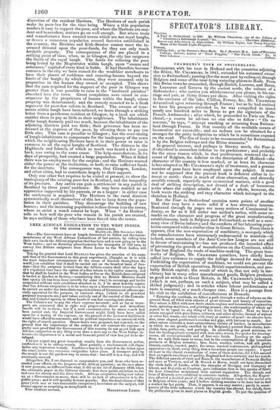}BEE AFRICAN EMIGRATION TO THE WEST INDIES.
TO THE EDITOR OF THE SPECTATOR.
Blackheath, 29th December 1842.
Sin—The Government have at length determined to follow out the recom- mendations of the West African Committees of last session, by taking into their own hands the African migration that has been and is now going on to the West Indies ; and on Saturday advertisements for transports of 350 tons, to convey free African emigrants from Sierra Leone to the West Indies, will appear.
Taking for granted that Lord STANLEY has given the sanction of his name and that of the Government to this great experiment, (fraught as it is with the most important consequences to the cause of freedom throughout the world,) on condition that it shall he carried out on the broadest basis of free- dom—that the emigrant invited from the African coasts shall after the lapse of a stipulated time have the option of a free return to his native country, and that he shall be landed in the West Indies as free as the British-born emigrant is landed at Quebec or Sydney,—considering that no British Minister would dare openly (it has been done covertly for some time) to encourage and invite emigration without such conditions attached to it, I do moat heartily rejoice that free African emigration is to be taken up as a Government measure—is to be carried on under the immediate superintendence of Government-officers spe- cially appointed for the purpose, in national ships, (which to all practical purposes transports are,) and taken entirely out of the control of the Commis• sion and Colonial agents, in whose bands it was fast running into abuse. The Colonies are to pay the whole expense incurred : and as far as trans- ports are concerned this is right and proper—the direct and immediate benefit will be to them ; but if a mail communication by steam vessels had been carried out, the Imperial Government might fairly have been called upon for a moiety of the expense, on the ground of the increased facilities it would have offered to commerce, and its political importance as connected with the right-of-search question. Steam-boats were proposed, but rejected, on the ground that the importance of the subject did not warrant the expense : a pretty sure proof that the Government of this country do not as yet look upon African emigration as any thing more than a mere sop to the West Indian in- terest—its importance in a moral and financial point of view has yet to be de- veloped. 1 do not expect any great immediate results from the Government action, confined as it is to sailing-vessels. Most probably a twelvemonth will elapse before any impression is made. Confidence has to be created in the tribes upon the coast, before any extensive emigration takes place. A transport paid by the month is not the quickest way to create that : but still it is a way, and will eventually succeed. Altogether, Sir, I am disposed to congratulate you, and those who have se- conded your efforts, on the progress of the African question ; on the new phase it now presents, so different from what it did on the 1st of January 1840, when the admirable paper in the Colonial Gazette first drew public attention to the real cure for slavery and the slave-trade. African emigration being now taken up as a Government mtasure, there will be no lack of advocates fur it in the public press; and it will speedily become popular. But the dead silence of that press (with one or two honourable exceptions) heretofore on the subject, will always appear as surprising as inexplicable to






















 Previous page
Previous page